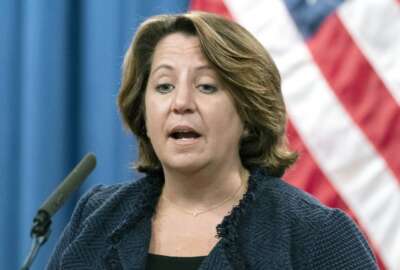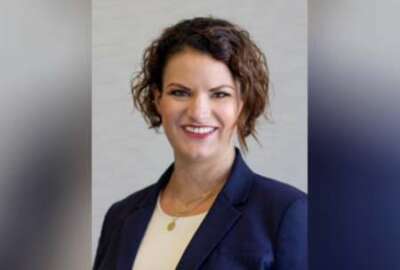Pentagon warns lawmakers to make sure they raise debt ceiling
In today's Federal Newscast, the Justice Department is bringing the power of the False Claims Act to the growing challenge of cybersecurity.
To listen to the Federal Newscast on your phone or mobile device, subscribe in PodcastOne or Apple Podcasts. The best listening experience on desktop can be found using Chrome, Firefox or Safari.
- The Defense Department is putting out the warning on the U.S. possibly defaulting on its loans. Defense Secretary Lloyd Austin said if Congress does not raise the debt ceiling it would undermine the economic strength on which the country’s national security rests. In a public statement, Austin laid out what could happen if the United States defaulted on the money it owes. Austin said military and survivor benefits would be put at risk, federal contractors might not get paid and the international reputation of the United States may be damaged. Congress has until Oct. 18 to raise the debt ceiling.
- Several bills giving inspectors general new authorities are making their way through Congress. Now more than 20 nonprofit groups are highlighting what they consider the most urgent IG reforms. The groups seek legislation that would require a president to give Congress a detailed explanation for firing an IG. They also seek giving IGs the authority to question agency officials that leave office before an investigation is over, and giving Congress tools to hold IGs accountable for alleged wrongdoing.
- The Justice Department launches a new initiative to hold federal contractors accountable for their cybersecurity efforts. It’s bringing the power of the False Claims Act to the growing challenge of cybersecurity. Government contractors now will face possible hefty penalties for not doing enough to secure networks and systems that hold federal data. DoJ yesterday announced the launch of the Civil Cyber-Fraud Initiative, which will be led by the Civil Division’s Commercial Litigation Branch, Fraud Section. The task force will pursue cybersecurity related fraud by government contractors and grant recipients through the False Claims Act and through the Qui Tam, or whistleblower, provision of the law.
- A fourth cybersecurity policy since August is almost ready for release. Federal Chief Information Security Officer Chris DeRusha said a new memo on end point detection and response is in the final stages. The EDR guidance would meet one of the 23 deadlines assigned to agencies under President Joe Biden’s cyber executive order issued in May. The Office of Management and Budget already has released memos on cyber incident event logging, for securing critical software and to implement a zero trust architecture. DeRusha said OMB is currently reviewing more than 100 comments on the draft zero trust strategy. A final strategy could be out by early 2022 if not before.
- The head of the Postal Service’s regulatory agency may stick around longer than expected. President Joe Biden expects to nominate Postal Regulatory Commission Chairman Michael Kubayanda for a full six-year term. The Senate confirmed Kubayanda in 2019 to serve out the rest of a partial term that expired in November 2020. But commissioners can serve out an additional holdover year if a replacement hasn’t been nominated and confirmed. As PRC chairman, Kubayanda has expressed concerns over the Postal Service recent decision to slow 40% of first-class mail delivery. (Federal News Network)
- Intelligence community officials pledge to continue their shift toward adopting commercially available products. It’s now a requirement for U.S. spy agencies to consider commercial imagery before they turn to government-owned satellites. The explosion of the geospatial industry has intel officials considering how to best take advantage of the influx of commercially available data. And they also want to reduce regulatory barriers for commercial companies. Principal Deputy Director of National Intelligence Stacey Dixon: “We want and we need the American GEOINT industry to be the strongest and most capable on Earth.” (Federal News Network)
- The National Geospatial Intelligence Agency’s new campus in St. Louis will be “unlike any other in the” intelligence community. That’s because about 20% of the building will be unclassified space, according to Vice Admiral Robert Sharp, director of the NGA. He said the agency will use the space to engage with industry, academia and the local community. The new campus is currently under construction and is projected to open in 2025.
- The Army is creating a new centralized directorate where soldiers can report sexual assault and harassment and receive needed services. The Fusion Directorate comes from the Army’s review of assaults in the military after a handful of violent incidents at Fort Hood in Texas. Fusion will put medical professionals, victim advocates and investigators all in one area to make it easier for victims to get help. (Federal News Network)
- The Merit Systems Protection Board is one small step closer to a quorum. The Senate Homeland Security and Governmental Affairs Committee advanced the president’s three nominees to fill the board. Committee members voted along party lines to advance the nomination for Cathy Harris, the president’s pick to be MSPB chairman. Committee Ranking Member Rob Portman said he still has concerns about Harris’ past statements and social media posts. The committee easily advanced the remaining nominees, Tristan Leavitt and Raymond Limon. All three nominations now head to the full Senate for a vote. The MSPB has been without a quorum for over four years.
- The Office of Personnel Management will check in again with agencies to see how they’re managing their human capital systems. OPM last conducted these reviews in 2019. It checks in regularly with other agencies to see how they’re meeting hiring, training and other workforce management goals. But these reviews will ensure agencies have tools and metrics in place to measure whether they’re meeting those broader human capital goals. OPM said it will begin these evaluations next spring.
- Federal employees celebrated the start of their annual donation drive with a special guest. The Combined Federal Campaign is hoping it can meet or exceed last year’s donations. Federal employees in the Washington region raised over $37 million in 2020. Vice President Kamala Harris, “It is truly a testament to your sense of purpose that you did this at a time when so many of you were experiencing your own hardships due to the pandemic. But that is who you are.” The CFC is celebrating its 60th anniversary this year. The campaign runs through Jan. 15.
Copyright © 2024 Federal News Network. All rights reserved. This website is not intended for users located within the European Economic Area.
Eric White
Eric White is news anchor and Federal Drive producer at Federal News Network.
Follow @FEDERALNEWSCAST
Related Stories
Congressional inaction on debt ceiling causes Treasury to take action with Thrift Savings Plan
Related Topics
All News
Benefits
Budget
Chris DeRusha
Combined Federal Campaign
Congress
Contracting
debt ceiling
Defense
Defense News
Department of Justice
discrimination cases
Federal Drive
Federal Newscast
Intelligence Community
Justice Department
Lloyd Austin
Management
Merit Systems Protection Board
military sexual assault
National Geospatial-Intelligence Agency
Office of Personnel Management
Pay
Pay & Benefits
Postal Regulatory Commission
Postal Service
sexual harassment complaints
Tom Temin
Workforce






